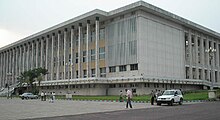
The People's Palace or Palace of the People (French: Palais du Peuple) is the seat of the National Assembly and the Senate in Kinshasa, Democratic Republic of Congo, formerly Zaire. It was completed in 1979 with a line of credit from the People's Republic of China. It has witnessed key moments in the country's political landscape, bearing witness to historic debates, legislative triumphs, and the exercise of democratic values. The building serves as a gathering place for lawmakers and a venue for official ceremonies.
Construction
The structure (along with a sugar refinery built in Kisanga and destroyed in the Congo Civil War) was constructed with an interest-free credit line of US$100 million in cooperation with the People's Republic of China from 1975 to 1979, after being commissioned by President Mobutu Sese Seko following his visit to China in 1973. The architecture was inspired by the Great Hall of the People designed by Zhang Bo (1911–1999) in Beijing. The site also includes the Kinshasa Martyrs' Stadium, contracted at the same time as the palace, a FIFA-class venue built by the Chinese in 1994. The remaining debt of US$42.3 million was forgiven by the Chinese Government in 1983.
Post-Zaire period

In June 1997, after the Alliance of Democratic Forces for the Liberation of Congo (AFDL) under Laurent-Désiré Kabila seized power, the Parliament of the Republic left the Palace of the Nation to settle in the Palace of the People.
Laurent-Désiré Kabila, president of the DRC, had overthrown United States' ally Mobutu, who died in exile in Morocco. After his assassination by a bodyguard in January 2001, Laurent-Désiré Kabila lay in state at the People's Palace for three days before being interred.
In December 2013, famed African rumba musician Tabu Ley Rochereau, sometimes known as "the African Elvis", lay in state at the People's Palace.
On 19 January 2015, after appeals from opposition parties standing against Laurent-Désiré Kabila's son and elected president Joseph Kabila's proposed plan to delay the scheduled 2016 elections until after a burdensome national census had been held, protesters gathered in front of the People's Palace. They were subsequently attacked with tear gas and live ammunition by government security forces. At least 42 people were killed in the violence.
See also
- Parliament of the Democratic Republic of the Congo
- National Assembly of the Democratic Republic of Congo
- Senate of the Democratic Republic of the Congo
References
- ^ Kisangani, Emizet Francois; Bobb, F. Scott (2009). Historical Dictionary of the Democratic Republic of the Congo (3rd ed.). Scarecrow Press. p. 75. ISBN 978-0810863255.
- "RDC : le débat sur la réforme de la Commission électorale se poursuit". PRESSAFRIK.COM, Premier journal en ligne au Sénégal et en Afrique de l'ouest (in French). Retrieved 2023-05-19.
- AFP, Source (2023-03-05). "Macron à Kinshasa : débat présidentiel sur la Françafrique". Le Point (in French). Retrieved 2023-05-19.
- https://www.facebook.com/RFI (2014-09-10). "Révision constitutionnelle en RDC: la société civile dans les débats". RFI (in French). Retrieved 2023-05-19.
{{cite web}}:|last=has generic name (help); External link in|last= - https://fr.allafrica.com/stories/200910121306.html
- ^ Hon, Tracy; Jansson, Johanna; Shelton, Garth; Liu, Haifang; Burke, Christopher; Kiala, Carine (2010). "Evaluating China's FOCAC commitments to Africa and mapping the way ahead" (PDF). Centre for Chinese Studies, University of Stellenbosch. p. 43. Archived from the original (PDF) on 24 August 2016. Retrieved 24 January 2011.
- Mianzenza, Aimé D. (10 October 2007). "Percée Tonituante de la Chine en République Démocratique du Congo: 6 milliards de US$ de prêt qui rend nerveux les Europeens" [Thunderous Breakthrough of China in the Democratic Republic of Congo: US $6 billion dollar loan makes Europeans nervous]. Centre d'études stratégiques du bassin du Congo (in French).
- Rowe, Peter G.; Kuan, Seng (2004). Architectural Encounters with Essence and Form in Modern China. MIT Press. p. 229. ISBN 026268151X.
- ^ "Points d'intérêt" [Points of Interest] (in French). Tourisme RDC Congo. Archived from the original on 2015-01-28.
- Oliver, Guy (2006). Almanack of World Football 2007:The definitive guide featuring all the facts and figures from the FIFA World Cup. Headline Book Publishing. p. 59. ISBN 0755315065.
- "Zaire: Relations with the Communist World". Library of Congress Country Studies. December 1993. Retrieved 15 February 2015.
- Simmons, Ann M. (24 January 2001). "Kabila's Funeral Held Amid Tight Security". Los Angeles Times. Retrieved 24 January 2015.
- Kimani, Sheila (30 November 2013). "Legendary Congolese Musician Tabu Ley Rochereau passes on". Standard Digital News.
- "DR Congo: UN Mission deplores loss of life as police, protesters clash in capital". UN News Centre. 20 January 2015. Retrieved 21 January 2015.
- Ross, Aaron (21 January 2015). "UPDATE 2-Congo protests enter third day, rights group says 42 dead". Reuters. Archived from the original on 21 January 2015. Retrieved 21 January 2015.
| Kinshasa, Democratic Republic of the Congo | ||
|---|---|---|
| History |  | |
| Transport | ||
| Landmarks | ||
| Education | ||
| Culture |
| |
4°19′56″S 15°18′11″E / 4.3322°S 15.3031°E / -4.3322; 15.3031
Categories: